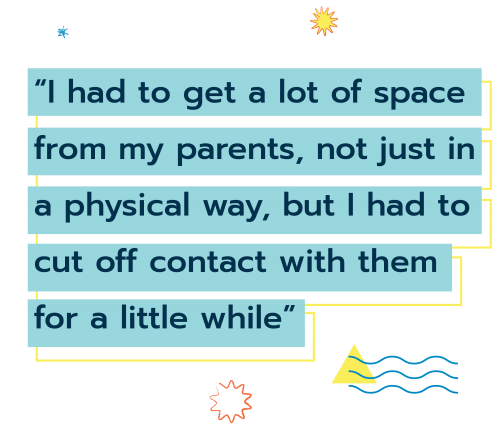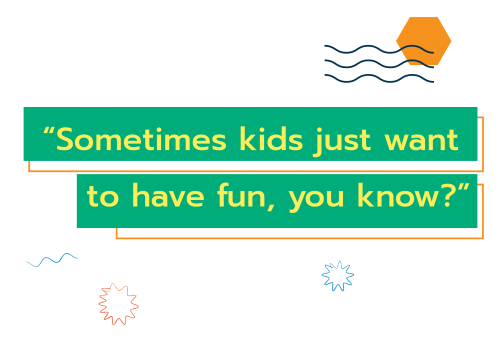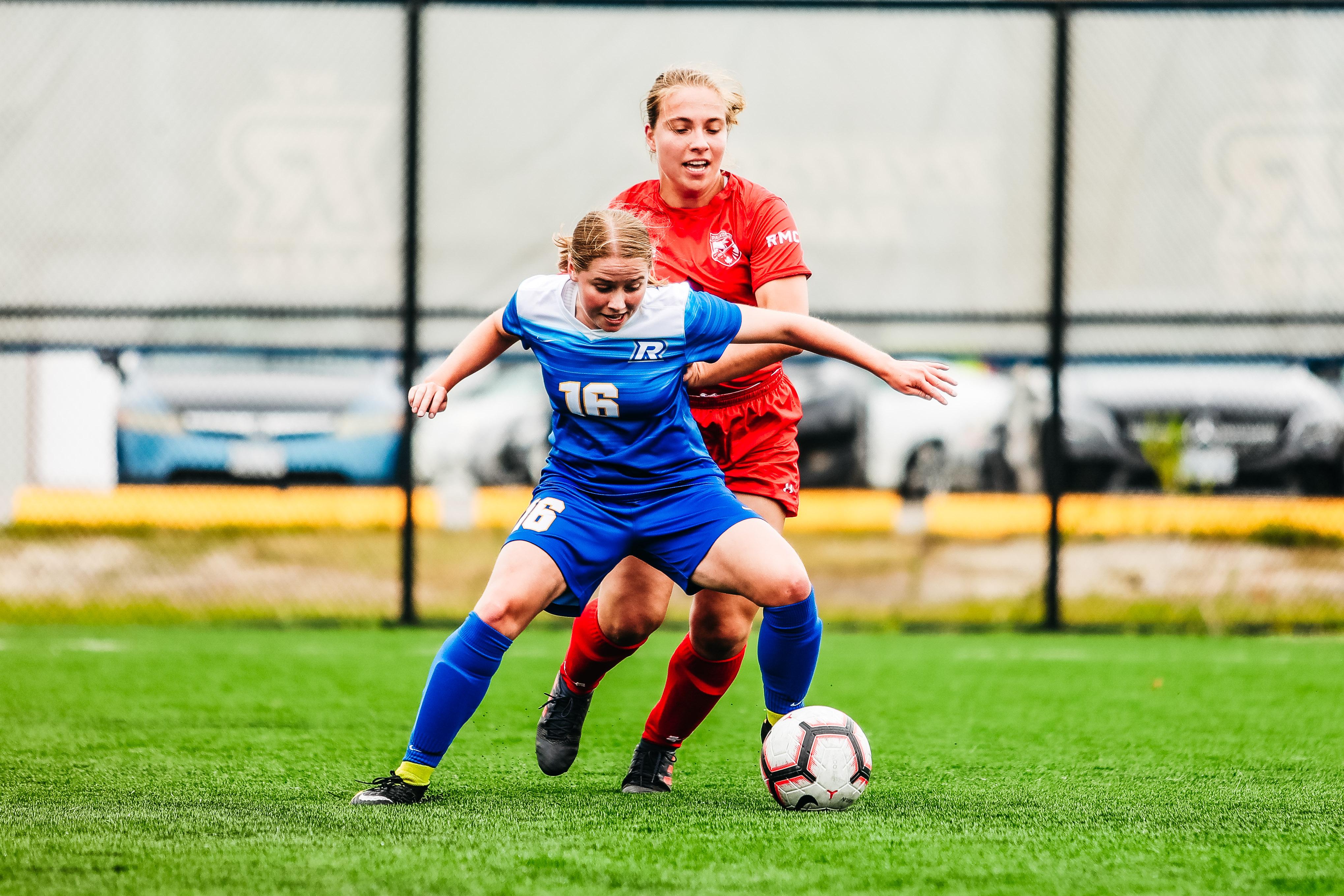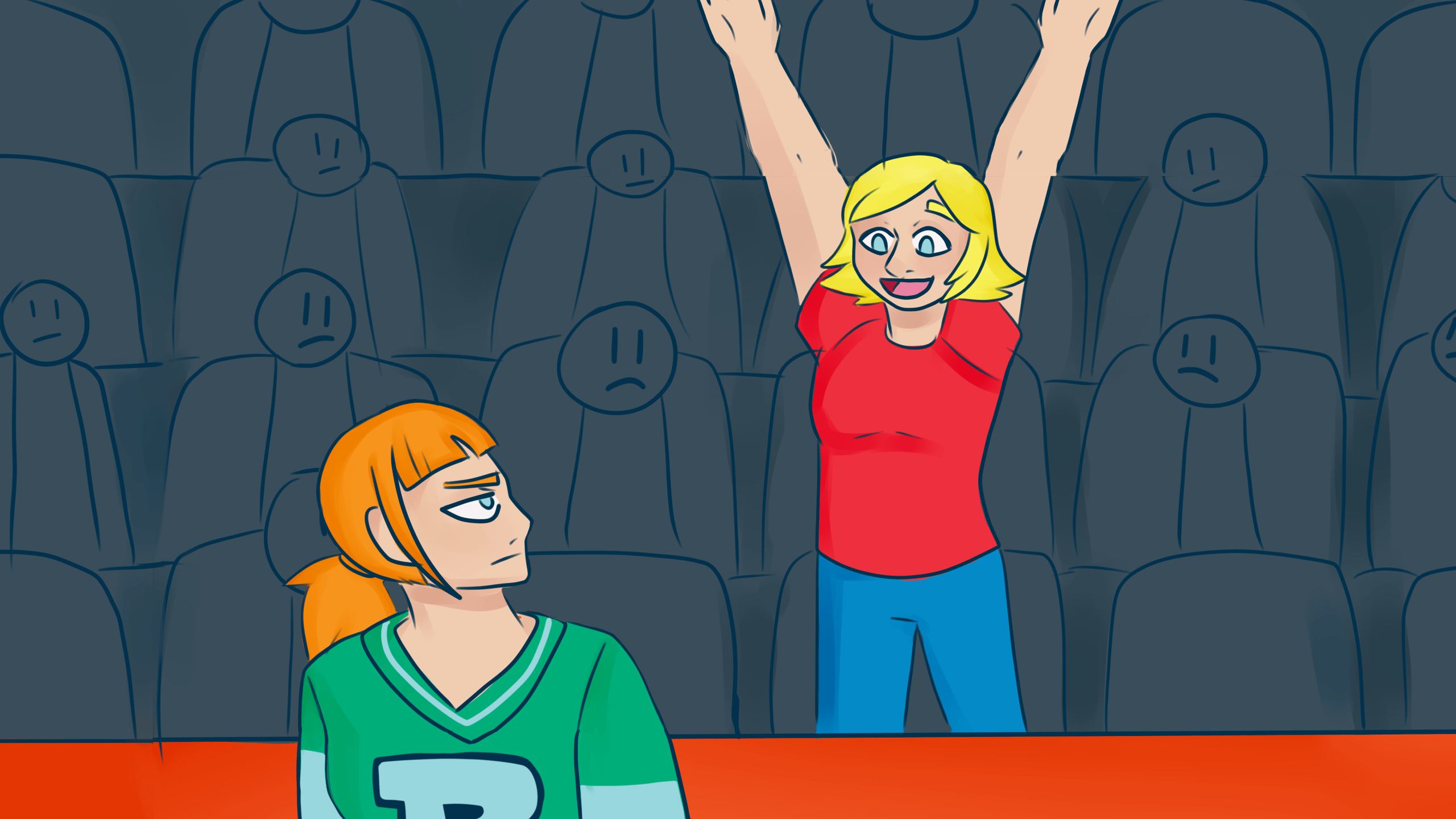Sometimes your biggest fans can turn into resentful critics
By Alexandra Holyk
Illustrations by Jaime Strand
Before every dance competition, Brianna Clarke’s mom did her daughter’s hair and makeup. Afterward, Clarke would take a moment to carefully review routines, stretch into her splits and straighten out every inch of her tutu. Backstage, she could gauge the size of the audience through the wings of the curtains before going on, seeing her parents in the front row every time. She had always hoped she wouldn’t disappoint them, but when she’d finish her performance, stifling a smile under the beams of light as she walked off the stage, she prepared herself for a lecture from her parents on how she could’ve done better.
Clarke was used to this “constructive criticism.” She started ballet when she was seven, but began taking dance more seriously when she was 13—studying a wider repertoire of genres and going to more competitions. With each performance, Clarke’s mom became more and more obsessed with the marking scheme at each competition—deciding which costume her daughter should wear and how complex Clarke’s technique needed to be in order to achieve a high mark.
By the time she was 17 years old, Clarke succumbed to only listening to her mother’s opinion of how she performed—which wasn’t always positive. This pressure, combined with having to choose where she would pursue her post-secondary education, led Clarke to develop an eating disorder near the end of her high school career.

All Clarke wanted was to move to New York City and perform on Broadway. And if she couldn’t get there, she planned to do some freelance dance work instead—despite her parents worrying about the instability that came with her career choice. As much as Clarke’s parents wanted to support her dreams, they couldn’t afford to pay for her to go to school abroad.
These factors played into the tension that built up between Clarke and her parents, and continued to impact her life in university. Moving away from Ottawa to go to Ryerson—a school that was nowhere near New York City, her first choice—was Clarke’s way of distancing herself from the pressure her parents put on her throughout her life as a dancer.
“I had to get a lot of space from my parents, not just in a physical way, but I had to cut off contact with them for a little while,” Clarke says.
According to a 2012 study by Minnesota State University, the difference between parental support and pressure in sports lies in how parents project themselves onto their children. Support is typically warmth and encouragement that assists athletes’ performance, whereas pressure is seen in behaviours that symbolize high or even unattainable expectations in the minds of young athletes.
David Telles-Langdon, an associate professor in sport coaching at the University of Winnipeg, says there are three main reasons parents pressure their children in sports. Some parents used to be high performers in a specific sport and feel their child should continue their legacy. Others pressure their children into achieving what they couldn’t when they were younger. And most believe that if their children do well in sports throughout their high school careers, they’ll win a generous scholarship to a prestigious university.
The 2012 study showed that a student athlete’s enjoyment and success is based on how they perceive their parents’ support and pressure—those who feel supported tend to be more motivated, whereas those who feel pressured are less likely to want to continue participating in their sport.
With this in mind, Ryerson student athletes have found that parental pressure can lead them to resenting their sport, or even their families.
Semi Won’s parents took her skating for the first time when she was eight years old. Back then, it was only intended to be a one-time thing. Won’s parents always thought she’d be a “normal student, not an athlete.”
The next thing they knew, they were moving across countries and cities, all for Won’s career as a figure skater. Almost a year after she joined the Anyang Skating Club in South Korea at age nine, her family moved to Barrie, Ont. in 2010 to bolster Won’s journey as a skater.
“Everything that [my parents have] done, and every cent that they’ve spent, went toward my skating career,” Won says.
Throughout many performances and competitions, Won quickly became one of the top junior skaters in Canada.
When Won noticed she wasn’t performing as well as she usually did, her family moved to Calgary in 2014 to give her a chance to skate with better coaches and a different team. And after a year, despite her improvement, Won realized she didn’t like the coaches in Calgary as much as she thought she would. This led her to ask her parents to move back to Ontario, Toronto specifically, where her old coach from Barrie now resided.

But by then, all the moving had taken a toll on Won’s relationship with her parents. After selling their house and moving across the country with no job prospects—only to return to Ontario—Won’s family had lost thousands of dollars while dealing with all the stressors of moving.
Won’s parents, who have consistently supported her throughout her figure skating career, caused her to feel so much pressure that she wasn’t able to perform as well as usual in some competitions.
When she got back to Toronto in 2015, the Canadian Figure Skating Championships rolled around in January. This was the first year she was eligible to compete because her family had received permanent residence status in Canada—meaning there was a lot of pressure on Won to do well.
So when she didn’t score as high as she wanted to, she felt like she disappointed her parents after all they did for her.
The following year, she had to quit skating because she sprained her ankle, broke her toes and was dealing with other physical and mental health problems—leaving her parents “heartbroken” for a year, trying to push her to keep going despite her pain.
When Won’s parents came to Canada, they struggled to make a life for themselves while focusing on supporting their daughter’s skating career. But when Won quit, they found themselves struggling to make a life for themselves that didn’t revolve around the rink. They continued to try and encourage her to get back into it—even saying she “[didn’t] have to worry about school and university,” if she maintained her high-performance level.
But Won didn’t listen to her parents right away and ended up resenting the sport and everything that came with it, which only worsened her injuries and mental state.
According to a 2011 study measuring trait anxiety in young athletes in the United States, parental pressure can also push student athletes to experience performance anxiety in addition to feeling resentment toward family members or their sport.
Parental pressure is at its worst when it impacts a player’s performance, says Telles-Langdon, who is also the Director of the National Coaching Institute in Manitoba. “I’ve known coaches that had to actually let athletes go from teams because the parents put so much pressure on them to train a certain way.” Parents often aren’t willing to accept their children are on the bench because of the pressure they’ve put on them and they just keep pushing harder. “It makes [the situation] worse,” he says.
After recovering and returning to the rink after three years, Won is now a first-year journalism student and member of Ryerson’s figure skating team. She says she’s seen a change in her relationship with her parents since they’ve finally been able to establish a life in Canada that doesn’t revolve around her skating career.
Her parents are happy and proud of their daughter’s reignited passion for skating, Won says, “They just want me to have fun and enjoy myself.”

ariah Hinds started playing hockey when she was three years old because her father saw it as an opportunity to embrace Canadian culture.
Though neither of her parents played hockey, they pushed Hinds to go to extra practices at age 11 without her teammates to improve her skills. Her mom would even make her go to hockey school to learn how to shoot better and “work on [her] game.”
“The extra stuff kind of made me not like the sport because it was beginning to get [to be] too much,” said Hinds. “Sometimes kids just want to have fun, you know?”
A 2017 study based in Italy on parental involvement in youth sports suggests that when young athletes feel pressured by their parents, openly discussing how they feel about their sport, given all the pressure they face, might be uncomfortable.
When Hinds decided to move to the U.S. for university, her relationship with her parents worsened. At Lindenwood University in St. Charles, Mo., Hinds was more than 1,000 kilometres away from home.
“I actually wanted to get some space from my family,” said Hinds, who also has five siblings. “I wanted some distance, but they didn’t like that too much.”
Hinds’ parents have also had a big influence on her career choice. She knows she won’t make a lot of money playing hockey—even if she played in the National Women’s Hockey League, she’d only be making between US$10,000 and US$26,000 annually as seen in 2015, according to The Globe and Mail. So her dad suggested that she find a job in the legal field.
“It was bred into me growing up, like, ‘You’re going to be a lawyer, that’s the career path we see for you,’” Hinds says.
Hinds has since moved back home and is in her second season with the Ryerson women’s hockey team. Although she says her relationship with her parents has gotten better, she still finds herself feeling pressured by them.
“My mom will text me in between periods…and tell me I’m having a bad game,” Hinds says. “Or my dad will come in between periods [to] the bench and be like, ‘Pick it up,’ or ‘You’re doing horribly.’”
“It kind of hurts, but it helps me in the long run,” she adds.
Hinds says the support she receives from her parents is mostly financial—the majority of the time, she feels pressured by them. When athletes have these additional anxious feelings it can heighten their already-high nervousness in sport performance.
According to a 2012 study facilitated by the University School of Physical Education in Krakòw, Poland, it is difficult for parents to differentiate between supporting and pressuring a child when it comes to playing sports. This is often because the support parents try to provide—yelling from the sidelines, arguing with the coach or telling their child to “do better”—doesn’t meet the age and needs of the young athlete.
Telles-Langdon says that parents should stay in their role as a support person rather than pushing their child.
“The pressure really should come from coaches and coaches are—and I would include university coaches in this—are well trained to recognize when a little push is good and when a little support is good, and parents don’t get that,” Telles-Langdon said.
“I don’t think they’re particularly good at reading their children that way, although they think they are.”
Brooke Pearson’s parents signed their daughter up for soccer when she was four years old, without really knowing what the sport was about. The Pearson family prided itself on its love for American football, but since there weren’t any flag football leagues for Brooke to join, they figured putting her in soccer at the Pickering Football Club was the next best thing.
When Brooke was about 13 years old and found herself unhappy playing with the team, her parents helped her transfer to Scarborough United—making sure she always had a ride to practice and someone to cheer her on at games.
Her dad, John, wanted to stay in the background of Brooke’s soccer career, making sure not to put too much pressure on his daughter. “As a parent, you’re always anxious for your kids to see them do well at anything,” he said.
A 2016 study conducted by Michael Godfrey found that parents often feel the need to have some sort of oversight in their children’s athletic careers. Godfrey, who is a graduate student at Wilfrid Laurier University in Waterloo, Ont., said the physical presence of parents at games or practices can lead to both supportive and undermining behaviour, which in turn can potentially negatively impact the players and the coaches.

“Parents on the sideline may be yelling instructions to the athletes on the playing field and hence, be engaging in…role conflict behaviours,” Godfrey states in the 2016 study.
“I don’t know anything about soccer so I don’t have that influence,” John says. “I’m a bit naïve [about] the game. So I let the experts—the coaches—coach, and I watch.”
John presents a more proactive way that parents can support their children in sports by not getting too involved, including arguing with the coach or with parents on the opposing team, as discussed in the 2017 study based in Italy. Parents should approach their children with a more understanding and encouraging perspective to benefit the young athletes, rather than bring them down—sometimes, all student-athletes want is support.
Though they might not be too familiar with soccer, Brooke’s parents continue to show their support by coming to her games at Downsview Park. Now in her second year of studying architecture while also playing on the Ryerson women’s soccer team, she finds that the most pressure she feels usually comes from herself.

“I want to do well, which probably comes from, you know, my parents raising me that way,” Brooke says. “I always want to make my parents proud…they put a lot of time and effort and money and hard work into being able to help me get through university and give me this opportunity…I don’t want to just waste it.”
Brooke visits her parents as often as she can and calls home whenever she can’t. When they come to watch her soccer games, it motivates her to play better—seeing them happy and cheering her on pushes her to get off the bench and score more goals. They’ve supported her both athletically and academically, leading their daughter to want to stay on the soccer team until she graduates.
Overall, John just hopes his daughter gets a good job in architecture and is enjoying herself in whatever she’s doing. “[We] want the best for her and to have the most fun.”
Now, when Clarke discusses her dance career with her parents—who still live in Ottawa—she still finds herself wanting to please them, but they don’t hold the same controlling power as they once did. Their “constructive criticism” regarding the instability of her future may still come up in the rare phone call, but Clarke realizes that their opinions on dance can be wrong.
In her final year of Ryerson’s performance dance program, Clarke says she’s been able to set boundaries with her parents. Though her mother’s opinion still means a lot to her, she refrains from telling her parents about upcoming auditions or freelancing opportunities to prevent recurring tension in her family.
“I look to my parents for guidance on how to be an adult, rather than how to be a dancer,” Clarke says, reflecting on her current relationship with her parents.
“Everything happens for a reason. I went through those experiences with my family…and I can’t look back in anger anymore because I think that it’s unproductive for the future.”













John Pearson
Thanks for the article insight ….and be safe out there in these COVID-19 Times.